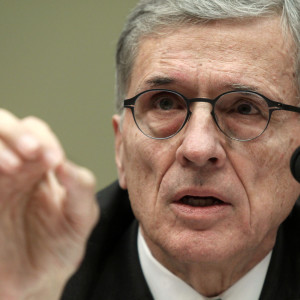The Federal Communications Commission voted Thursday to advance rules mandating pay-TV providers open up their networks to third party set-top boxes, and give subscribers the choice of purchasing third-party boxes instead of renting them monthly from providers themselves.
Commissioners voted 3-2 along partisan lines to adopt Chairman Tom Wheeler’s notice of proposed rulemaking to “unlock the box,” and allow third-party developers like Google to manufacture and sell set-top boxes to subscribers of pay-TV providers like Comcast, Time Warner Cable and others, whose customers typically rent such devices for a monthly fee.
Democratic Commissioners Mignon Clyburn and Jessica Rosenworcel sided with Wheeler on the vote during the FCC’s open meeting Thursday, while Republican Commissioners Ajit Pai and Michael O’Rielly dissented.
O’Rielly repeated the concerns of the biggest names in the television industry, chiefly the potential for third-party devices to open providers’ video content to copyright violation via video recording. He also raised questions over advertising manipulation by letting third-party devices add or remove commercials and infringe on subscribers’ privacy through data collection.
The Republican commissioner said the proposed rules come at a time when the industry is “moving away from set-top boxes” via video streaming services like Netflix, Hulu, Amazon Prime and even channels including HBO, and that a proposal focusing on hardware could slow the app-based direction of the industry.
“Our goal should not be to unlock the box; it should be to eliminate the box,” Pai agreed. “If you are a cable customer and you don’t want to have a set-top box, you shouldn’t be required to have one. This goal is technically feasible, and it reflects most consumers’ preferences — including my own.”
Pai said previous FCC regulation in the set-top box market shaped the current system, which costs Americans $20 billion a year in rental fees and $500 million in kilowatt hours in energy consumption, “enough to power all the homes in Washington, D.C. for three months.”
In his proposal announcement last month, Wheeler said 99 percent of pay-TV subscribers lease their set-top boxes, paying on average $231 annually to do so. The cost of those devices has risen 185 percent, while the cost of computers, TVs and mobile phones has dropped 90 percent.
Pai, the Republican commissioner, pointed out the rules wouldn’t take affect for two years after their adoption, making it likely technology will have outpaced the rules by then, and he added multichannel video programming distributors (MVPDs) and electronics manufacturers are unlikely to agree on formats, specifications and standards that would make third-party boxes workable.
“The odds are probably better that Mark Zuckerberg will agree to Kanye West’s request for $1 billion,” Pai joked.
Pay-TV providers told Pai’s office the rules could interfere with current network architectures, and require a second set-top box in the home to work with a third-party box. Minority programmers added it could give third-party developers more opportunity to make it harder to access foreign-language programming by burying it in search results.
Wheeler dismissed those concerns, pointing to the FCC’s congressional mandate to facilitate competition in the market according to Section 629 of the Communications Act, adding the rules will mirror existing set-top box rules in copyright, privacy, etc. with the exception of opening up the market to third-party devices, which will be forced to adhere to the same rules.
During a press conference after the meeting Wheeler said the rules will prohibit third-party boxes and apps from interfering with advertising content, and clarified MVPDs are not barred from offering their information streams without a box if they choose, so long as they make those same streams available to third parties.
“Existing copyrights and programming agreements are unaffected,” Wheeler said. “Nothing in this proposal slows down or stops cable innovation.”
“But it sure does create opportunities for minority programmers to reach consumers through the Internet,” he said.
Wheeler pointed to the FCC’s past action in the mobile phone market ensuring providers offer a range of devices from third-party manufacturers, which he argued bred significant innovation and competition in the smartphone market.
“Consumers can now choose video content from a multitude of pay-TV providers, numerous online subscription services, watch on their smartphones and a host of other options,” president of USTelecom Walter McCormick said after the meeting. “The FCC’s thumb on the scales will inevitably straightjacket innovation and harm competition, neither of which will serve the public interest.”
Gene Kimmelman, CEO of the digital consumer advocacy group Public Knowledge, accused companies of being more concerned with losing their set-top box market monopoly than the pace of innovation during a Wednesday conference call with reporters.
“You can do a lot of things with a cable company once you pay a $100, $125, $150 for their service, their set-top box and their broadband offering. And then you can sometimes get Roku and others,” Kimmelman said. “We’re trying to change that model. We want consumers to be able to buy broadband or a skinny package and then go to third parties for add-on services.”
“They have so much of their monopoly profits on the line, they have all the incentive to distort this,” he added.
Under the notice passed Thursday, the FCC will hear 30 days of comment on the rules, followed by 30 days of replies.

